Text
“What if Annatar resembled Finrod “
Celebrimbor who cared for Finrod deeply couldn’t help but see glimpses of Finrod in Annatar , in how he looks and how he acts sometimes.
Celebrimbor glimpsed in Annatar's form echoes of Finrod, the noble and beloved friend lost. The way Annatar moved, spoke, it all bore a resemblance to Finrod.
Sauron knew this, weaving his deceitful web. For he had watched how Finrod comforted his companions in the dark dungeons of Tol in Gaurhoth
So it was that Annatar's guise became a cruel mirror, reflecting back the memory of a cherished friend lost but never forgotten. And in that twisted reflection, Celebrimbor found himself drawn ever closer, his trust and loyalty given to the very source of this cruelty.
#Galadriel looking around like :do I have to do everything around here#the fact that Sauron took everything from him#which even after reincarnation its effect still holds#incredibly beautiful#death was not an escape#and sad#why are like this?#just writing things to cry about#what is wrong with us#and the world#cause#thats not normal#but eh who cares#tolkien#and his drama and angs#and everything that comes with it#i guess
210 notes
·
View notes
Photo
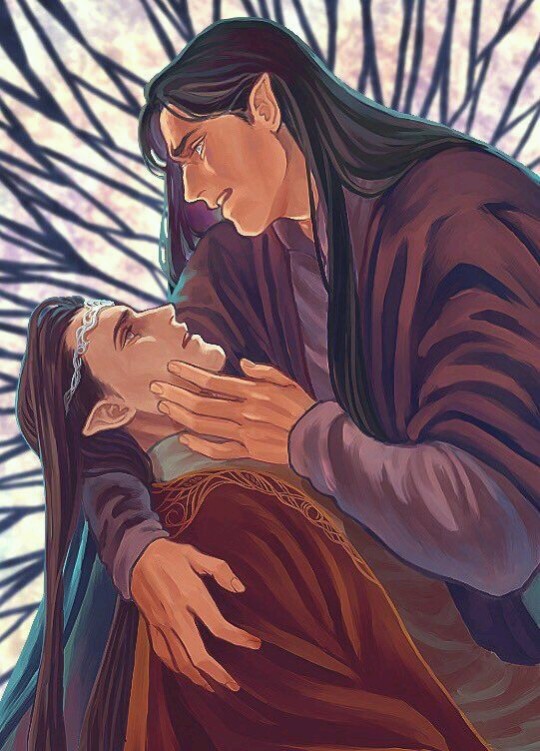
Fëanor and Finwë… this breaks my heart!!
#JRR Tolkien #The Silmarillion #Feanor #Finwë
1K notes
·
View notes
Text
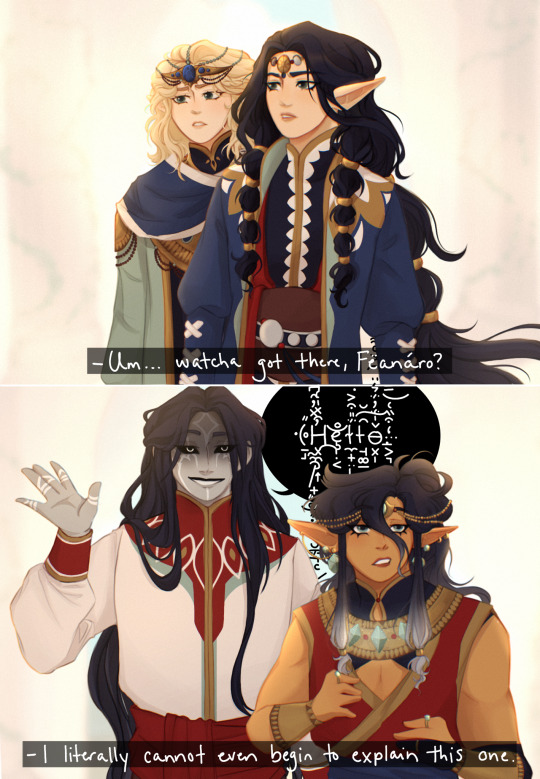
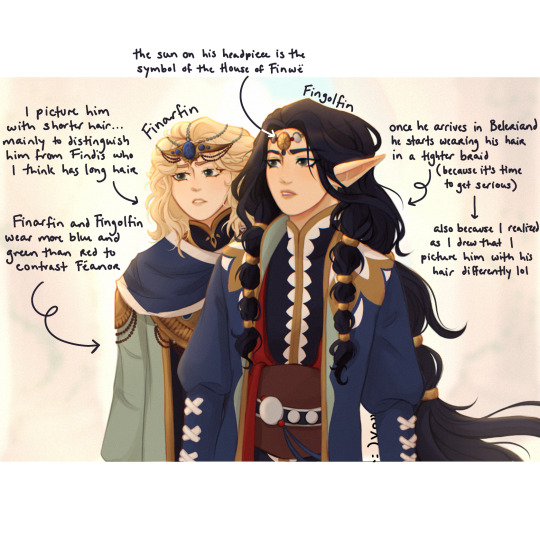

Elf posting continues. ✌️✌️✌️
This took a very long time because the only character I really had a design ironed out for was Feanor, so i had to design Finarfin, Fingolfin, and Melkor's form he took in Aman post-unchaining.
This idea came from remembering that part of Silm where Feanor essentially yelled at Melkor to get off his lawn and leave him alone. I got to thinking what if he didn't "get thee gone" and instead just stuck around like a creepy assistant? Everyone's stress levels would be super high all the time that's for sure!
#silm fandom#silm art#silmarillion#silm fanart#feanor#finarfin#fingolfin#morgoth#melkor#tolkien#silm stuff#tellearts#i love the designs#they are so beautiful#wow
176 notes
·
View notes
Text
One of my favorite Elrond headcanons is the idea that he starts out looking very much human and elvish. He has ears too pointed to be a man's, but not nearly long enough to be an elf's, his father's (grandfather's, really) blue eyes and brown hair that shines like an elf's, but gets tangled far too often.
Sure, some weird things happen around Elrond as a child– the birds that seems to follow him, the way some injuries mysteriously resolve in his prescense, the unusual flowers that bloom outside his windows– but really, it's easy to see those as distant remnants of an ainuric power that Elrond clearly didn't inherit. When he comes to Gil-Galad's camp, it's much easier for them to see Tuor or Beren in him than it is to think he's descended from Melian.
But then time passes. The changes are slow enough– happening over decades or centuries– that no one really notices at first. Elrond's hair darkens until it is as black as the night sky– as black as Luthien's was. His eyes leach color until they are gray– not Noldor gray, mind, but a strange, starry gray that some of the Iathrim whisper about. His voice changes, almost seems to take on an echo of itself, sometimes.
The strange things that happen around him only get stranger– the trees bend to shelter him, during storms, and sometimes when he sings, the birds sing with him. Elrond got a cat, right at the start of the Second Age– a gift from Gil-Galad. Somehow, it never seems to grow old or die. The parts of Lindon Elrond most often visits always seem to be in full bloom, no matter what season it is. His healing abilities surpass what is to be expected of a man– an elf– eventually, of what seems possible at all.
At the end of the First Age, it would've been hard to believe Elrond had more than a trickle of ainur blood in him. By the beginning of the Third Age, many have started to whisper about Rivendell– a new Doriath, ruled by a Maiarin lord with all Melian's grace, and her eccentricities.
Elrond doesn't realize just how much he's changed until the day, late in the Third Age, when he finds Maglor wandering on the shoreline. Nothing he says will convince Maglor that he isn't Luthien's spirit, returned from death to haunt him.
#silmarillion#silm headcanons#elrond#elrond peredhel#eldritch peredhel#maglor#Everyone collectively decided to not say anything about it#they love Elrond too much to cause such a headache for him#Elrond is everyones favourite#and he's accidentally became even more of a maia than his ancestors#it wasn't intentional but now he also somehow became a patron of unions#it just happened#Elrond would like to come to Valinor and be normal but the maiar there are enamored with him and everything#the elves are the same but are more tactful which says something considering most of them are Noldor#don't even start me on the drama that the re-embodied Fëanorians cause when they see a male Luthien hugging the two oldest brothers#and calling them 'Atto' and 'Atya'
627 notes
·
View notes
Text
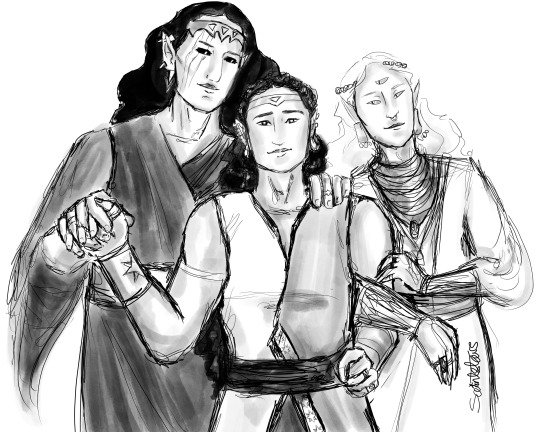
*holding microphone* So Celebrimbor, you saved middle earth by...*checking notes and frowning*
*Tyelpe, leaning into the mic* ...by topping the dark lords? Yes.
#help#silvergifting#angbang#silvergifting x angbang#celebrimbor#tyelpë#tyelperinquar#mairon#melkor#morgoth#sauron#annatar#silm crack#silm#the silmarillion#idk#i don't even know at this point
89 notes
·
View notes
Text
Bilbo Baggins would actually be the most unhinged character if he was in the events of the Silmarillion. Like if he was to be magically transported into the First Age Beleriand. I feel like he would adopt and be adopted by every creature residing in Beleriand. Including Morgoth
#silmarillion#the hobbit bilbo#bilbo baggins#tolkien#beleriand#silm#bilbo#he would run the show#silmaril what silmaril#idk what you talking about#it's just a shiny rock!#:bilbo probably
426 notes
·
View notes
Text
A Refutation of Claims Made by Professor Basil Dyer in the Minas Tirith Review
for @silmarillionepistolary | M | ao3
It has come to my attention that The Minas Tirith Review has recently published an essay by one Professor Basil Dyer detailing and reinterpreting letters exchanged between Fingon, son of Fingolfin, and Maedhros, son of Fëanor, in light of recent translations and publications of long-censored exchanges. In his composition, Dyer claims the letters show evidence of long-established homoaffective relationship between the two, beginning shortly after Fingon’s arrival and in Beleriand, and continuing until his death.
This turn in the discourse is troubling, both because of the undue and perverse attention which it may attract to this noble publication and for the aspersions which it may cast upon the already well-sullied reputation of the historiographer. Perhaps if there was any academic merit behind them such faults may be forgiven, but they consist of nothing besides applying an all-too-modern understandings of customs (and the ever-loosening morality of the age of Man!) onto the long-gone age of the Eldar.
That said, I shall begin by laying out the terms of the engagement. Let us assume, for the sake of simplicity and brevity both, that there is no doubt on the matter of authenticity of the letters exchanged between our two principal figures during the Long Peace. Even the most recently recovered—and most hotly contested—of these letters, dated F.A. 345, referred to in the previous publication by the first lines (“Concerning the matter of honey…”) and sometimes abbreviated as the “honey missive” (alternately, in particularly tasteless publications, the “honey-thigh letter”) in such discourses, shall be accepted into our metaphorical evidence box (though indeed any reader familiar with my previous publications might be predisposed to hold its veracity in some doubt). I shall also reference the K. M. Singer translation of all available letters as the most widely-accepted and aspire to make no reference to the probable inaccuracies in Singer’s understanding of Quenya terms of endearment and vocabulary regarding parts of the body.
It may be wise to note before we begin that ladies of a delicate composition and children may find frank discussions of homosexual activity unnerving and inflaming. I would urge readers to exercise caution.
And so, our terms of engagement well-laid, I shall begin by establishing the reasons any romantic or sexual entanglement between Fingon of the House of Fingolfin and Maedhros of the House of Feanor is entirely impossible, then move on to a sensible and scholarly interpretation of the letters.
First, I draw the attention of noble reader first to the matter of cousin-marriage among the Eldar. While laws prohibiting cousin-marriage may appear novel and controversial to the modern Gondorian—indeed even a generation ago such unions were common among Men—the Eldar have once again proved perceptive beyond the ancient days during which they lived, and our betters in matters of morality and purity.
I will not bore the reader with a recounting of the Fall of Gondolin, but work only to draw the reader’s attention to the doomed romantic entanglement at its center. Maeglin, the nephew of the King, coming out of savage darkness, saw Idril, the king’s daughter, and loved her. Given the depth of infatuation he purportedly developed it seems likely to the modern sociologist that for some time she encouraged this attention. Of course, as a highborn Noldo raised among a peoples of impeccable moral discretion, she had known for the beginning that such an affair could not bear any fruit. Such knowledge could not be expected from Maeglin, and many attribute his eventual decline and betrayal of the city to a broken and aching heart.
That such an understanding was so plain to her and yet not to him may seem strange. Were they not both elves, living in the first of age of Arda, and nearly of the same blood? The answer to such a query might come from the relative moral tightness of Noldor society. Recall that Maeglin was no native Gondolian, but a son of the house of Eöl, and so of mixed Sindar and Avar heritage. All recording of first-cousin marriages among Elven Kin, as few as they are, come from lowborn elves among these two tribes. Recall that neither grey-elven nor dark-elven tribes, as their names suggest, had ever journeyed to the sacred light of the Blessed Isles, nor received council from the Valar. Their traditions and customs, then, may seen as more akin to those of Men than elves, lacking the moral rigor of their light-elf counterparts.
Though I do not claim to liken homosexual acts to the sacred institution of marriage, one must admit that the act of bodily union is shared among the two, and so may be held in common as forbidden under the laws of the Noldor.
With those facts in mind we must return to the matter of Fingon of Hithlum and Maedhros of Himring, famously first-cousins through the lines of their fathers. There is no question that that both were elves full-grown upon their departure to Middle-Earth, that according to all sources Fingon was a particularly devout follower of Aran Einior, the lord of air and great judge. Though the latter acts of Maedhros indicate a rather tenuous connection to the sacred laws of his people, Fingon’s devotion did not waver in his lifetime. Raised in such a morally upright culture, neither of them likely would have been able to conceive of engaging in any unholy union. Indeed, such a thought must have been so far from their minds as to allow a certain looseness of the tongue and purity of platonic intimacy, as evidenced by some of the exchanges I address.
Next we must discuss homosexuality among the Eldar. For years the historical establishment has maintained that no homosexual activity had ever existed among elven-folk; indeed, it is an affliction that appears to trouble only the modern Man. That school of thought has been challenged recently, with very little justice. Basil Dyer and Feya Patrice, two of the most infamous names subscribing to this school of thought, point to articles of elven art which they claim contain themes of same-sex entanglements. Most notable among these are Fragment #221 by Daeron the Bard, which appears addressed to a male lover, surviving recreations of Lalwendë and a Friend in Bed by an unknown artist, and a series of oil lamps recovered from Eregion which seem to depict various sexual acts between elves. This evidence is scant, and spurious at best. More detailed refutations of the first two—clearly expressions of deep platonic affection or affectation of a different character—may be found in my earlier bodies of work, while the last is plain done in the spirit of parody.
Indeed writings by earlier historians indicate that no desire could occur between elves without procreative desire, plainly rendering same-sex unions impossible. Relationships which modern historians sometimes interpret as homosexual are indeed better described with the elven understanding of melotorni and meletheldi, translated as chosen love-brothers and love-sisters respectively. That some form of platonic physical intimacy might have existed within these bonds is inarguable, but plainly it did not rise to the unholy stirrings of the flesh.
All of the surviving letters available to us are those addressed from Maedhros to Fingon. Though these do not use the term meletorni directly, it is plain to see that many terms of brotherly affection to enter their forms of address. The opening of letter #5, addressed F. A. 302, has been much maligned, for to a modern reader it appears rather excessive in its affection. “Most beloved of cousins,” Maedhros writes, “how I miss thy kisses, and the weight of thy body atop mine, and the sweet softness of thy ear-tips beneath my mouth” —and on, in such a fashion, for a time. A modern reader may see conventions of a love-letter within these words. A historian intimately familiar with the details of the correspondence of the eldest son of Feanor would argue otherwise. Indeed, Maedhros appears often expressive of his affection.
Of his surviving letters only remains which is addressed to Maglor the Bard, the eldest of his brothers and his second in command, mailed in F. A. 456, pleads with him to “take heart, and hold close my kisses.” Similarly, journals kept by contemporaries note nothing unusual in exchanges of kisses between friends, brothers, cousins, and so forth. A later elven play following the events of the Fall of Nargothrond features a kiss between Finrod and Orodreth in parting; similarly, artistic depictions of Finwë’s death often show his son kissing his face and his lips. What may seem unthinkable to the modern Gondorian was indeed quite commonplace among the Noldor.
Which brings us to another turn of phrase in letter #5, which has gained some level of infamy among those determined to read perversion into the intimacy of their friendship. Lines 304-314 read as follows: “I have received thy handkerchief, with the sweet scent of thy sweat and thy perfume, and the imprints of thy lip-paint kisses. Know that I have sewn it now against the heart of my sleep-robes, so each night I might feel thee upon my breast, and that a hundred times now I have kissed the same cloth as thou hast.”
I would not blame the modern man whose mind conjures a young woman pressing lipstick-kissed onto a postcard for her beloved, but in cultural context the meaning of these words changes. While it may appear rather odd in our time, lip-paint was common for men and women both among the Noldor. Being, for all their nobility, at times a vain people, the Noldor historically likened physical beauty to battle-prowess. The sending of lipstick-prints can be read as a show of force and physical ability between two young men, somewhat akin to bragging. The answering kisses, then, signal not a desire for intimacy but answering show of strength and of power.
I may go on for some time to discuss each mention on kisses in the surviving letters, I would assume any discerning reader would be able to understand them by now as brotherly affection. And so, without further delay, I will move on to address the honey missive.
First, let us examine lines 2-13 of the honey missive, the most hotly debated in meaning:
“Concerning the matter of honey; while I should be glad to sample any taste of the spring of Hithlum thou shouldst be willing to share with me, we have no great need of in trade. The wiry clover and harebell of Himring make for surprisingly subtle yet fragrant honey, thick and amber-gold. But indeed so taken with thee I am that even thoughts of trade I return to thee, and of honey; how I sit and think of thee bare before me—of how I might take such sweetness and spread it upon thy handsome thighs, to work clean with my mouth. I would be much obliged if thou wert to write to me of how thou wouldst stir beneath me, and call my name—indeed nothing now could make me happier.”
In interpreting this passage, we must remember the positions of the Noldor as craftsmen and admirers of art. Despite being remembered now primarily as a warlord, Maedhros was born the son of a gem-smith and a sculptor, and was raised in a society which placed much appreciation on both masculine and feminine beauty. That in his time Fingon was considered beautiful is undoubtedly true. The rest, while resembling a sexual act to some readers, is plainly ridiculous, meant in all likelihood as a joking exaggeration. It is common among young men even in our time to joke crudely with each other; if we had Fingon’s letter of response I am certain we would see a laughing refusal.
Having examined the scope of the evidence before us, I believe any reasonable reader would be forced to yield to the rightness of my position, and to admit there is nothing at all to the claims of those like Dyer, who seek to introduce perversion into the annals of history. We must then examine the motivations behind these claims, and wonder if Dyer and his ilk might not mean to work backwards, seeking justify their modern-day inclinations by creating precedent where is none. It is said, after all, that Basil Dyer has not cohabitated with his wife since the first two weeks of their thirty-year marriage.
59 notes
·
View notes
Text
He also provides Bilbo with three ages (maybe more) old Finwëan family drama. It's more than enough to last that hobbit till the end of the world.
"bilbo's poetry must be so embarrassing for elrond" is out
"elrond weaponises bilbo's embarrassing poetry" is in
elrond is old! he's heard it all before! there is not a single topic bilbo could write on that he has not been forced to listen to someone recite on before. at least bilbo doesn't expect him to be particularly grateful or honoured by it.
however! that does not mean other people have reached the same level of "sure bilbo you can write a limerick about maglor" that elrond is on.
so bilbo gets elrond's full permission to write whatever he wants IF he promises to wheel out the really, really sensitive stuff on request (when there are visitors Elrond doesn't like or a diplomat is being annoying)
712 notes
·
View notes
Text
Glorfindel, the legendary hero of Gondolin, with a dazzling personality, gorgeous blond hair, a delightful smile, who gets along with everyone, who was re-embodied and granted great powers by the Valar: Haha, Erestor is so out of my league
Erestor, chief counselor of Imladris, with a sharp wit, arresting blue eyes, a charming laugh, who can best anyone in a debate, who has seen three ages and has the wisdom to prove it: Glorfindel? Out of my league
#lotr#lord of the rings#silm#silmarillion#glorfindel#erestor#glorestor#now#this is my favorite glorestor dynamic
233 notes
·
View notes
Text
A very important update to my Maglor = Erestor, Finrod = Gildor, and Daeron = Lindir post.
They all take shifts as the Tra-la-la-lally elf.
Gildor thinks it's delightful and uses it as a chance to talk to all the valley's visitors. He actually uses some of his free time to teach Glorfindel some basic bard skills. Glorfindel is surprisingly into it.
Lindir refused to at first because he's composed full symphonies before, why should he spend his time on that, but then Gandalf accused him of being too afraid to improvise rhyming lyrics and the challenge was on.
Erestor just desperately needs some Tra-la-la-lally in his life. He's also re-learning to sing without making everyone around him experience the horrors. It's good practice.
Elrond, who arranged this, thought it was a master stroke because surely, if they have to talk to each other about Tra-la-la-lally duty, they'll realize, right?
They've all become pretty good friends over the years, and spend plenty of time together! They still have no idea.
Thranduil's gotten in on the betting pool. He's betting on it taking divine intervention.
#silmarillion#silm headcanons#rivendell#imladris#maglor#erestor#finrod#gildor#daeron#lindir#elrond#glorfindel#gandalf#thranduil#tra la la lally elf#this is a tragedy for Elrond and a comedy for everyone else
232 notes
·
View notes
Text
Elrond: “Do not forget: this is a stealth mission. Your group can only include one divinely powered member, so I’m afraid you are going to have to choose between Gandalf and Glorfindel.”
Frodo: “Well, we already know Gandalf, and it’s not like we’re going to run into situations where we’d rather have Glorfindel than Gandalf…”
(Some time later, in the mines of Moria…)
Gandalf: (to Eru) “Very funny, boss. Outright hilarious. Ugh.”
#The Lord of the Rings#lotr#the fellowship of the ring#The silmarillion#Gandalf#Elrond#Glorfindel#Frodo Baggins
651 notes
·
View notes
Text
Fic Concept: Erestor is Maglor, Lindir is Daeron, and Gildor is Finrod. They all live in Rivendell in the Third Age. They're all using elf magic to try and hide their identities, so they don't recognize each other.
Lindir has heard Galadriel call Gildor kin but assumes that Gildor is like, Finrod's son or something because Finrod would absolutely name a child "Gildor Inglorion."
Erestor has heard Lindir sing some very familiar old Sindarin lays but assumes that he must just know them because of how popuar Daeron's compositions were. Nevermind that many of them are lost to history by the Third Age.
Gildor knows Erestor is Feanorian because he's not as subtle as he thinks but he doesn't really sing around people anymore– because singing the Noldolante for thousands of years straight has made his voice extremely dangerous– so Gildor assumes he's just another old Feanorian follower.
Elrond and Gandalf are making bets about when they'll realize. Elrond bet it would happen before the Fourth Age. It's not looking good for them.
#silmarillion#rivendell#maglor#erestor#daeron#lindir#finrod#gildor#elrond#gandalf#these aren't my usual headcanons for these guys#but it would be *really* funny#secret identity#but it's Noldor so it must be more dramatic than necessary#daeron isn't noticing that fact on purpose#because it would be outrageous#to be as dramatic as those unruly Noldor#Finrod is having too much fun to care#and Maglor has always been too dramatic for his own good#I feel like I should also tag#Finwëan family drama#because let's be honest#everything is about them
662 notes
·
View notes
Text
I am no one important but I feel like every voice of support matters in situations like this.
So I'm reposting with my own, let's say interaction with this war.
I am polish. We had lot's of people from our neighbour coming in, running from this war and destruction it causes. I had a boy in my class, he was one such person. I will not name him, but.. yeah. I could see how it weighed on him. How it weighs on all of you. And so, even though I can't do much to help, I repost, cause I feel like it may help.
Know this. We hear you, we see your suffering and we want to help. All people with information, good information about your situation are wishing you a victory. Maybe it won't help, maybe me writing this won't give you much hope. But do not lose yourself in this. Look for even a second of happiness because it's worth it. We see you. And you are not as alone as you may think yourself.
Again, I'm not anybody important, I'm not from wealthy family, or anything. I'm just a person on Tumblr who saw this post and decided, "maybe it will help, maybe I can give someone even a little bit of hope". So, yeah. You are gonna live through this. Have hope, because as long as you live, so does live your country. Buildings can be rebuilt. Ukraine is you, the people. Live, have hope. We polish people have experience with helpless situations. And history shows that you can survive this, get up and rebuild. So please, have hope.
I, on the other hand, hope that this somehow helped.
Not gonna lie, my morale is at the lowest point it's been since the beginning of the invasion. Russians are successfully occupying more and more territories and shell frontline regions every day. People are dying, our culture and herritage is destroyed. International aid dwindled significantly because of american bullshit. Mobilization law has been signed and there is a chance that my family members get conscripted soon. Don't even get me started on internal political problems. A bunch of articles in foreign media talking about our defeat and "peace talks" (what a joke).
It feels like there were no at least moderately good news in a while. On top of that, the feeling that we are screaming into the void is stronger than ever. I'm happy when I see a foreigner online supporting us and spreading the word, because it gets rarer. Ukrainians feel like none of what's happening gets outside our info bubble. Most likely no one but Ukrainians will see this post either. Honestly don't know what to make of all of this.
3K notes
·
View notes
Text
Day 5: Tears Unnumbered
A letter from the private archives of Lord Elrond of Rivendell, now kept in the Royal Archives of Arnor.
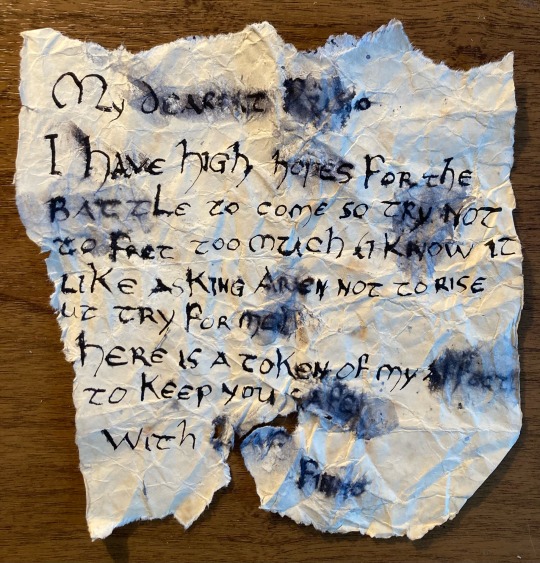
My d[e]ar[es]t R[uk]o (name uncertain),
I have high hopes for the battle to come so tr[y] [n]ot to fret too much (I know it […] like asking A[rie]n not to rise [b]ut try for me.)
Here is a token of my [word illegible] to keep you safe (?).
With [word illegilble],
Fin[no]
Despite the obvious damage, this letter dated to the second half of the First Age is remarkably preserved from time thanks to countless layers of Elven enchantments. All the damage seems to have been inflicted during the lifetime of the person who received this letter (Elf Ruko), probably due to poor conditions of storage. The spots and smudges let the historians think they may be tears, for the paper shows no other sign of water damage, and some words are worn out by what may be frequent touch.
We may make the educated guess that this letter was re-read by the elf called Ruko after the battle as they mourned their friend Finno and was an object of high personal value. The historians of the First Age agree that the battle mentioned in this letter is likely to be the Nirnaeth Arnoediad, the battles of Tears Unnumbered, as it fits in the timeframe this letter is dated from.
Despite its briefness, this letter is a precious and rare testimony of a close friendship between two soldiers, showing that, despite the state of semi-constant war of the First Age, there was an efficient messenger service between the Elven strongholds.
We know not how this letter ended in the keeping of Lord Elrond of Rivendell, nor why he put such care in its preservation, but this is one of the last written primary sources we have from the First Age and we can only be grateful it survived to this day to offer us a brief glimpse of two unknown, long dead Elves.
156 notes
·
View notes
Text
Silmarillion dancing headcanons
I feel like dance is a pretty important part of Elvish culture right? I generally imagine their dancing a little like set dancing but a lot more elaborate and flowing. Like the movements are a bit more natural and they don’t keep their arms at their side like we do in Irish dance. It’s mainly the fast and elaborate footwork that I feel they would really enjoy. They also dance in pairs sometimes and it’s a little more intimate than traditional in set dancing incorporating elements of slow dancing but at a very fast pace.
All this to say, I’ve become ridiculous attached to the idea of Maedhros and Fingon causing political uproar by joining in and pairing up for a dance at a big event during the Union of Maedhros. Like it’s meant to be a political statement about unity and they start by clasping hands at shoulder level and following the steps carefully with perfect posture. But not even halfway through Maedhros is lifting Fingon’s feet off the ground by holding his waist as they spin around and they’re just laughing and completely forgetting everything around them. They twirl each other around and follow the steps with their hands on each other’s hips and waists pressed way closer together than necessary. Maedhros is way too focused on the way Fingon’s smile lights up his face and Fingon is entranced by the way the firelight makes Maedhros’ newly grown out hair glint like real flames.
I will also die on the hill that they develop knife dancing at some point during the first age. Like it’s normal fast paced jigging and spinning and then people start hurling knives over each others heads and catching and twirling them. I feel like that’s exactly the sort of reckless needlessly self endangering activity the Noldor would come up with. Maglor and Maedhros probably use this as a training exercise for Elrond and Elros to let them have a bit of fun for once.
This reaches it’s peak around the early second age after the War of Wrath, when everyone is still carrying knives at their belts and reflexes are wired for battle but for once feels like they can properly enjoy themselves in recreation and let go a little. So what I’m saying is that in the early days of Lindon when they didn’t have dignitaries from other cities around to be shocked by it, they wouldn’t have formal parties in ballrooms or anything like that, they’d start a big bonfire somewhere and have this absolutely insane, wild ceilí dance involving a lot of knives.
And Elrond absolutely loves it. He’s one of the best, particularly at the dances involving knives (go figure), and he’s sometimes viewed as a slightly more feral version of Luthien. Gil Galad once jokingly said Tinuviel, while they were dancing together and one of the knives Elrond threw to him was aimed rather closer to his head than Elrond would normally allow. Him and Elros try to teach it to some of the Numenoreans once but they all look at them like they’re insane. Imladris has a similar policy of toning it down among visitors but Aragorn does pick it up after growing up there and the fellowship are all pretty appalled when he tries to explain it to them. When he asks Legolas to back him up Legolas says that it is not actually an Elvish thing it’s just an “Elrond was raised feral in the woods by kinslayers” kind of thing.
#silmarillion#tolkien#elrond#lotr#maglor#elrond peredhel#maedhros#lord of the rings#feanor#the silmarillion#elrond half elven#elven culture
300 notes
·
View notes
Text
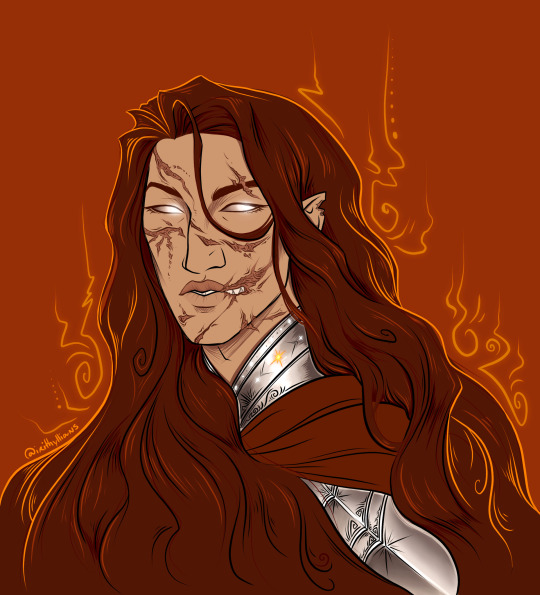
POV: you are an orc that got lost on your evening stroll
899 notes
·
View notes
Text
What if Lindir was the child of Maglor and Daeron
Just saying
59 notes
·
View notes